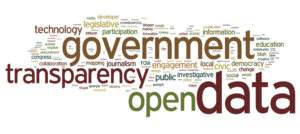Instructor: Kelly Kaufhold, Ph.D.
Week of March 25

Description
This week, we’ll talk about data journalism. You’ll learn about how media organizations tell stories with data.
Objectives
- Understand the different types of data
- Understand how media organizations use data to tell stories
- Analyze data from different open data sources
This module is taugh by Dr. Kelly Kaufhold, who worked as a multimedia journalist for 20 years and used data in his reporting on politics, science and business. Data, and telling stories with data, have both been around for a long time.
Data basically comes in two forms:
1) Individual, or discrete data – one case or person at a time, like property, tax or arrest records;
2) Aggregate, or grouped data – many cases on one topic all at once, like unemployment rates, FBI Uniform Crime Statistics or the U.S. Census.
In May, I’ll show you some examples of discrete data which you may find useful working with student journalists and I’ll have a variety of examples in the video and links for this week, but for this module and section of the PhDigital Bootcamp we’re going to concentrate on aggregate data.
First, watch this video introducing you to telling stories with data, including some history and examples; then see the suggested homework, below.
During your lecture in May, we’ll get a lot more hands-on and you’ll do much more than find and sort data; you’ll learn how to compare one column with others in Pivot Tables; how to clean and check your data and your analyses; and I’ll show you some visualization tools that quickly let you turn a spreadsheet into an interactive visual.
In the coding module of the in-person segment, you’ll learn some additional techniques for creating interactive data visualizations.
Here are a few recent examples of reporting with data:
Top 0.1% hold as much wealth as bottom 90%
http://www.businessinsider.com/share-of-us-household-wealth-by-income-level-2016-11?r=UK&IR=T
Fantasy football is sports with data
Americans are leaving the East Coast and Midwest moving to the West Coast
http://www.dailymail.co.uk/news/article-5229083/Moving-study-People-continuing-west.html
Data in politics to build “psychological targeting” of voters
More gun sales = more accidental gun deaths
Tracking cell phone data (without your permission) to analyze your Thanksgiving habits!
Finally, we’ll visit the Texas Tribune after the data lecture – the Trib has a whole page of interactive data you can peruse to tell your own story with their data:
https://www.texastribune.org/series/news-apps-graphics-databases/
I especially like their visualization of how much Texas universities spend on athletics:
https://college-sports.texastribune.org/
Discussion
You’ll have two assignments for this week:
1) Find an example of data reporting and share a link to it on the #datajournalism Slack channel;
2) Search for some data, find a dataset you like and share it with us; AND, write a short note on what you learned from looking at the data.
Post those, share any questions, comments or requests on our Slack channel for #datajournalism this week and you can also email me at kellykaufhold@txstate.edu
Additional Data Sources
Some places to look for data, in addition to a Google search with filetype:xls
The National Institute for Computer-Assisted Reporting maintains a big list of sources for data
Propublica, which is an independent investigative journalism outlet which partners with major news outlets like the New York Times and Washington Post, also maintains a list of data sources
https://www.propublica.org/datastore/
U.S. Census (select the Data tab)
https://www.census.gov/en.html
U.S. Census data download center
https://factfinder.census.gov/faces/nav/jsf/pages/download_center.xhtml
U.S. Census data downloads by topic (income, education, population, race…)
https://www.census.gov/support/USACdataDownloads.html
Enigma is a repository of databases on lots of industries and governments
Harvard’s “Dataverse” collects links to lots of open data – public, free. This is largely a collection of data from academics, like Dr. Carter and Dr. Kaufhold, who choose to share their data with other researchers.
Cooperative Congressional Election Study (a DETAILED multi-year database of election details)
Pew Center for the People and the Press (lots of opinion surveys about current events)
http://www.people-press.org/datasets/
Data World provides a large, diverse clearinghouse of global data, especially around trade and economic issues (you can get 3 datasets for free)
This UK site also has links to lots of fun business-related datasets
http://www.makeovermonday.co.uk/data/
Crime data
https://www.bjs.gov/rawdata.cfm
Government data links (one repository for TONS of federal government data on crime, health, manufacturing…)
Data on gun thefts in the U.S.
https://www.thetrace.org/missing-pieces-data/
=== The Art and Science of Data Driven Journalism – a whole book ===
This is a whole book on data journalism, written by experts and published by the Tow Center for Digital Journalism at the Columbia School of Journalism, Columbia University, New York
http://towcenter.org/wp-content/uploads/2014/05/Tow-Center-Data-Driven-Journalism.pdf
